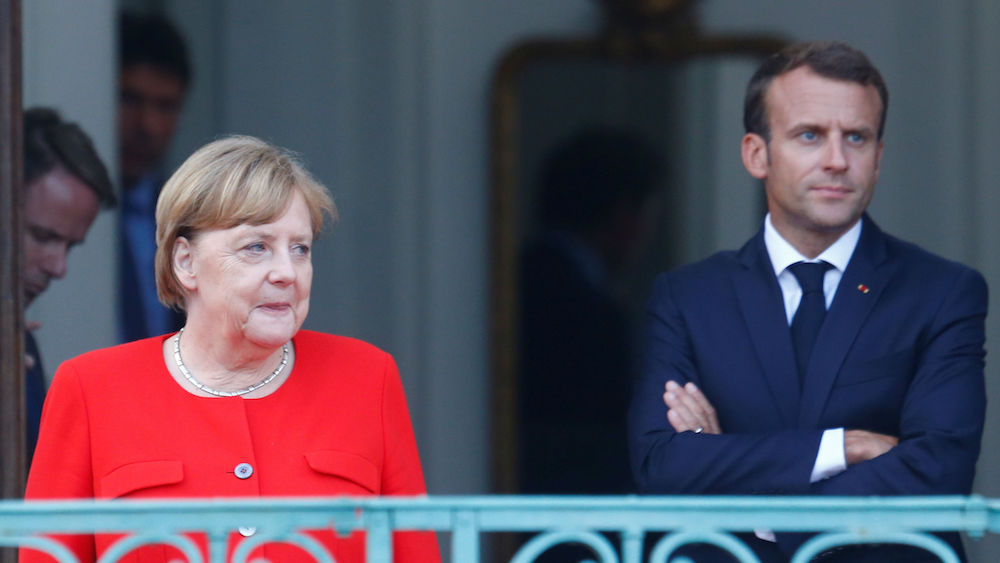The German chancellor has great tactical skills. But that’s not enough anymore to fend off populism and move Europe forward.
Even under pressure, Angela Merkel excels at tactics. Recently on the domestic front, she skillfully played for time to keep her government from breaking up. Just one day later, at a meeting with France’s President Emmanuel Macron and the most important ministers of both governments, Merkel pulled off an agreement on EU reform. It’s not yet victory snatched from the jaws of defeat, but two big steps have been taken.
Yet Merkel’s strength is her weakness, too. The méthode Merkel is built on a low-key approach, a firm grasp of detail, an avoidance of all emotions, and a gift for delaying unpleasant decisions. It’s a highly effective toolkit for international negotiations as well as for dealing with internal rivals. But it has left Merkel unable to provide the bigger picture that Germany and Europe need to be able to fend off populism. So over time, Merkel is actually contributing to the erosion of her own power base.
Take the refugee issue that nearly brought down her government last week. On the surface, it is a petty quarrel within the conservative bloc. Merkel’s Bavarian ally, the Christian Social Union (CSU), is terrified it will lose it absolute majority in the regional elections scheduled for October. To stop the rise of the right-wing populist Alternative für Deutschland (AfD), the CSU is trying to demonstrate how tough it is on immigration.
In Berlin, the CSU is part of Merkel’s coalition and it just so happens that her interior minister Horst Seehofer is leader of that party. Seehofer, never a friend to Merkel, recently announced that he would instruct the German border police to refuse entry to refugees already registered elsewhere in the EU. He then upped the stakes by saying that as interior minister, he could take this measure without the chancellor’s agreement.
Never mind that rejecting refugees at the border would be legally problematic. It might be ineffective as well because other EU countries could simply stop registering refugees. From the CSU’s point of view, the measure still has three benefits: It speaks to popular concerns over the number of refugees admitted to Germany; it is a unilateral national measure, which should please euroskeptic voters on the right; and it allows the CSU to confront Merkel, which tends to play well in Bavaria.
Merkel could not let this challenge to her authority pass, nor could she accept a complete repudiation of her 2015 open-border policy for refugees, regardless of her own efforts to cut down on the number of asylum seekers admitted to Germany since. So she made it clear that Seehofer would be fired from the government if he implemented the border measure against her will.
No Drama Merkel
This could have led to a high noon-type shoot-out, a break-up of the conservative bloc and the end of the government—except for Merkel’s dislike of drama and her skilful use of delaying tactics. With little fuss, she persuaded the CSU to give her two weeks to try and sort out asylum policy at the European level. At best, this endeavor will yield a partial success—but in the meantime, the CSU has stepped back from the brink. It will not find it easy to rekindle its revolutionary fire.
In tactical terms, Merkel played her hand well. But looking at the bigger picture, she carries much of the responsibility for making refugee policy such a poisonous issue in the first place. Germany—like many other countries in the world—is deeply divided over immigration and the cultural and religious conflicts resulting from it. The chancellor, having taken the decision to let in a million refugees in 2015, failed to provide any kind of vision of how to hold a much more diverse society together.
Nor has Merkel been able to assure the public that the security issues are under control. There have been several highly publicized violent crimes committed by refugees; this week saw the opening of a trial against a young Afghan man accused of murdering his 15-year-old German girlfriend out of jealousy. The government has also come under pressure because thousands of refugees in Bremen were allegedly granted asylum without being checked. Such incidents gain weight because Merkel and her government have failed to provide and communicate a comprehensive strategy on migration.
On Europe, the situation is similar. To avoid conflict within her own coalition, Merkel postponed her answer to Macron’s bold proposals on EU reform for as long as possible. On a small scale, this has worked well for her: the CSU is now concentrating on asylum policy and won’t be able to raise a huge stink over euro reform before the EU summit at the end of June. At the same time, Merkel got Macron—who for his own domestic reasons urgently needed German concessions on the euro—to pledge his support on the asylum issues.
Yet none of this adds up to a big picture or even an overall sense of direction. After the catastrophic G7 summit with US President Donald Trump in Canada in early June, Merkel understands that Germany needs Europe more than ever. But she still does not explain how she sees the future of Europe, its role in the world, and its social and political cohesion.
It is this lack of a larger narrative that allows populist movements to fill the vacuum with their nationalistic and xenophobic interpretation of the world. This is just as true for migration policies as for European integration. The méthode Merkel may be very useful to defend power in the short term. But given the fundamental nature of the challenges that Germany and Europe are facing, it is simply not enough.







